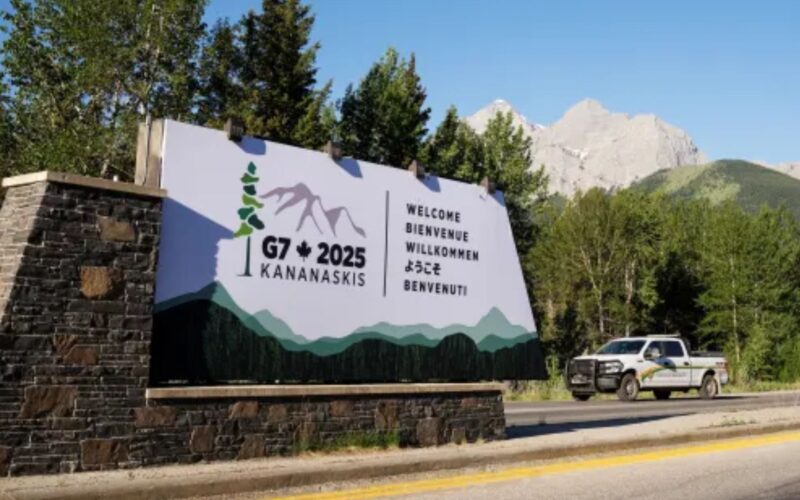Alberta (Rajeev Sharma): Leaders of the world’s most powerful democracies are gathering in the scenic Canadian Rockies for the 51st G7 Summit, set to begin Sunday and run through June 17. Hosted this year by Canada in the remote town of Kananaskis, Alberta, the summit comes at a time of mounting global tensions and shifting geopolitical dynamics.
The Group of Seven, comprising Canada, France, Germany, Italy, Japan, the United Kingdom, and the United States, is meeting against the backdrop of intensifying conflict in the Middle East, evolving trade realignments, and deepening concerns over security, technology, and the global economy.
A Legacy of Influence and Tensions
The G7 traces its roots to 1975, when it began as the G6 in Rambouillet, France. Canada joined a year later, and Russia briefly expanded the group into the G8 in 1998, until its suspension in 2014 following the annexation of Crimea.
Now back to its original format, the G7 remains a powerful economic bloc, representing 44% of global GDP but just 10% of the world’s population. Yet the group’s cohesion has been tested repeatedly, not least by the return of Donald Trump to the presidency of the United States.
High-Stakes Attendance
This year’s summit, chaired by Canadian Prime Minister Mark Carney, will include not only G7 leaders and the European Union, but also several invited global leaders. Among them are Indian Prime Minister Narendra Modi, Mexican President Claudia Sheinbaum, and Ukrainian President Volodymyr Zelenskyy.
The inclusion of Modi has stirred controversy in Canada, where diplomatic ties with India remain strained following accusations by former Prime Minister Justin Trudeau that Indian agents were involved in the assassination of a Sikh separatist leader in 2023. Sikh advocacy groups in Canada have sharply criticized the invitation.
Carney, however, defended the move, citing India’s pivotal role in global trade and its status as the world’s fifth-largest economy. “We have made progress on law enforcement dialogue,” he told reporters. “The invitation reflects both geopolitical reality and ongoing bilateral engagement.”
Also expected to attend are leaders from Australia, Brazil, Indonesia, South Korea, and South Africa. Saudi Crown Prince Mohammed bin Salman was invited, though his participation remains uncertain.
Middle East Crisis Looms Large
One of the key flashpoints at this year’s summit is the rapidly escalating conflict between Israel and Iran. Just days ago, Israel launched a series of airstrikes targeting Iran’s nuclear and military infrastructure, prompting missile retaliation from Tehran. With fears of a wider regional war mounting, G7 leaders are expected to urgently discuss ways to de-escalate the crisis.
Trade Tensions Reignite
Trade will also be a contentious issue. President Trump, who returned to power earlier this year, has reimposed broad tariffs on G7 allies, sparking concerns of a renewed global trade war. While a temporary pause on tariffs was granted to most countries, excluding China, which recently struck a deal with the US, the uncertainty has left many nations scrambling to negotiate exemptions.
The UK recently secured a deal with the US to reduce tariffs on American goods, but the EU and Japan are still seeking agreements before Trump’s 90-day moratorium expires in July.
Despite the friction, insiders suggest Canada will aim to keep formal discussions focused on consensus-building rather than confrontational trade issues. “We’re not looking for a repeat of 2018,” one Canadian official said, referring to the year Trump walked out of the summit, called then-Prime Minister Trudeau “weak,” and refused to endorse the final communique.
Will Trump Play Nice?
Trump’s return has reignited debate over America’s role in the G7. In the past, he criticized the forum for expecting the US to “act as the world’s bank.” However, experts believe a more strategic Trump may emerge this time. John Kirton, director of the G7 Research Group at the University of Toronto, noted that Trump may avoid theatrics to preserve the group ahead of a potential U.S.-hosted summit in 2027.
“He wants to deliver the ‘biggest, best summit’ two years from now, so there’s a strong incentive for him to keep the peace this year,” Kirton told NDTV World.
What’s Officially on the Agenda?
According to the G7 Summit 2025 official site, the core themes of this year’s discussions are:
- Protecting Communities Worldwide
- Building Energy Security and Accelerating the Digital Transition
- Securing Future Partnerships
However, the real-world agenda is expected to go far beyond that. In addition to the Israel-Iran conflict and global trade tensions, leaders are expected to discuss:
- The ongoing war in Ukraine
- China’s growing influence and technology-related policies
- Climate change and energy transition strategies
- Strengthening global supply chains and cybersecurity cooperation
A Summit of Significance
As the world navigates unprecedented challenges, the 2025 G7 Summit offers a crucial platform for dialogue and diplomacy. Whether it fosters unity or exposes widening divisions, the days ahead in Alberta could shape the direction of global leadership in the years to come.

